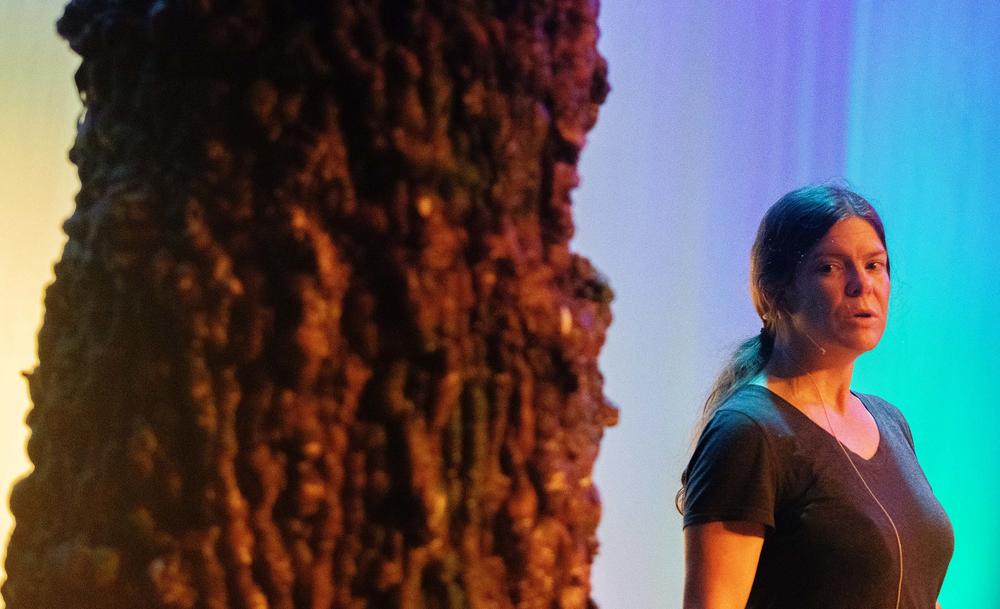
Caption
Mary Kathryn Nagle rehearses her play "On the Far End" at Theatre Macon ahead of her performance there.
Credit: Grant Blankenship/GPB News
|Updated: September 13, 2024 6:43 AM

Mary Kathryn Nagle rehearses her play "On the Far End" at Theatre Macon ahead of her performance there.
Add theater to the list of art offerings at this year’s Ocmulgee Indigenous Celebration, an annual event in Macon-Bibb that has come to be a homecoming for citizens of the Muscogee (Creek) Nation of Oklahoma.
Mary Kathryn Nagle is an attorney, playwright and enrolled citizen of the Cherokee Nation of Oklahoma whose works have been performed in New York and Washington DC. As part of the annual Ocmulgee celebration, Nagle will be performing her one woman show “On the Far End” Friday night at Theatre Macon. Admission is free.
Nagle said the name of the play comes from the first four words written by US Supreme Court Justice Neil Gorsuch in his opinion in the case McGirt v. Oklahoma: “On the far end of the Trail of Tears there was a promise.”
“The play is really a love letter to that decision from the perspective of Jean Hill Chaudhuri, a Muscogee woman activist and playwright,” Nagle said. “McGirt kind of frames the entire play.”
The McGirt decision reestablished the borders of reservations in Oklahoma, including the borders of the Muscogee (Creek) Nation, thereby touching an area of expertise for Nagle in her legal practice: tribal sovereignty.
“Oftentimes, whether or not a tribal nation continues to exist or exercise its sovereignty is dependent on white expectations and white narratives of land, entitlement and power… law and all these things,” Nagle said. “And what the decision really said was, you know, it's irrelevant if white Oklahomans or the current governor have in their mind this narrative or this idea that Muscogee Creek Nation's reservation no longer existed. It is still there. It was never disestablished.”
The promise those borders would remain inviolable was the same promise Neil Gorsuch referenced in his opinion in McGirt.
Nagle said Jean Hill Chaudhuri, the subject of her play, was born in a time when that promise was being destroyed.
“She was born on the ‘Far End’ and she survived at a time when they were really still trying to eliminate and eradicate Muscogee people and the Muscogee Nation entirely,” Nagle said.
Nagle said Chaudhuri survived being forced into a residential school by the Bureau of Indian Affairs by running away no fewer than 8 times before she made it home.
As an adult Chaudhuri was active in politics and community organizing circles in Native communities from Florida to Oklahoma and Arizona.
“She’s a miracle worker and a healer and a woman I admire deeply,” Nagle said of Chaudhuri who also happened to be her mother-in-law.
Chaudhuri died in 1997, years before the McGirt decision said the Muscogee nation borders should still be on the map. Nagle said you can still see the fingerprint of Chaudhuri and women like her in the decision.
“This victory for the Muscogee (Creek) Nation today was made possible by generations of Muskogee women like Jean, who kept fighting for the rights of their children and grandchildren and the next generation to come,” Nagle said.
Nagle said she hopes her audience leaves with a better understanding of McGirt and tribal sovereignty, and that she also gives Jean Hill Chaudhuri the honor she is due.
"On the Far End" will be performed at 8pm, Friday Sept. 13 at Theatre Macon. Admission is free.
Ocmulgee Mounds National Historical Park and the Ocmulgee Mounds Association host the 32nd annual Ocmulgee Indigenous Celebration Sept. 14 and 15, 2024, from 10 a.m. to 5 p.m. Event parking is located at the Macon Bibb County Health Plaza, 171 Emery Highway. Click here for more information.